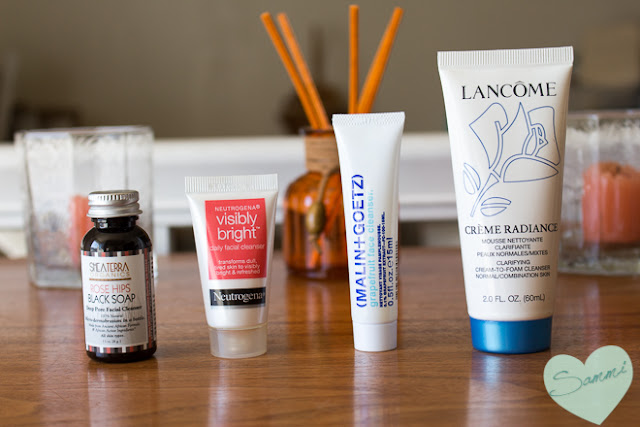Hello, friends! It's been awhile since I did a "Skincare How-to," so I figured it was about time we fixed that. We already talked about How to Determine Your Skin Type, so the only logical next step is to use that knowledge and develop a skincare routine. With the sheer amount of products and information out there, it's easy to get overwhelmed. Before we go into talking about complex stuff like retinoids and chemical exfoliation, let's just go back to basics. In the wise words of Julie Andrews, "Let's start at the very beginning."
Step 1: Ask Yourself "Why?"
Why are you starting your skincare routine? What's the problem that you're facing? Did your first wrinkle freak you out? Are you contemplating doing something drastic to remove those blackheads from your nose? My mother bought me my very first skin products when I was in middle school because I kept complaining that my face felt tight. The issues you're facing will help you figure out what your skin type is and what products you should be using. I did a whole post on How to Determine Your Skin Type last year, so if you're feeling a little lost, that reference is there for you!
Step 2: Go Shopping
If you're just starting to incorporate skincare products in your daily routine, it's best to start out light. It's not going to be easy switching from using nothing to having to use a complex five-product routine, and you might not stick with it. Start off small. If it only takes a few minutes each day, you'll be more likely to do it. You don't need an arsenal of products to address your issues in the beginning. Let's just pick up two (important!) products to start out:
Cleanser
You've all heard of face wash. It's like soap, for your face. It's not really just soap, though--using the same soap you use on your body on your face will most likely dry it out. Products are formulated for different things. You don't wash your dishes with laundry detergent, do you? It's the same thing with skin care. Get something that's formulated for your face, and your skin type. Take what we talked about in Step 1 and keep it in mind. I like to look up product reviews online on various beauty blogs, as well as checked out how products ranked on Makeup Alley.I could write a book on choosing a cleanser for your skin type, but I'll try to keep things short.
What you don't want is a foaming cleanser. The soap creating that lovely foam can put the skin's pH out of whack, making it alkaline, aka a breeding ground for bacteria. Definitely a no-go for the acne-prone especially.
What you do want is something that is going to gently remove the dirt and grime from your skin without sending your face into a frenzy. Many dermatologists recommend Cetaphil's Gentle Skin Cleanser for All Skin Types to nearly everyone, but it's notorious among estheticians for clogging pores, so if that's something you struggle with then you might find this cleanser won't work for you. But that's why there are so many options out there!
That's not to say you have to use it forever (unless you want to, in which case go ahead). Just use it long enough to gauge how your skin feels after you use it. Does it feel stripped of moisture? You might want to pick something more moisturizing, such as a creamy cleanser, milk cleanser, or cleansing balm. It's all about using a product, seeing what you think about it, and switching to a different one if it doesn't do what you want it to.
 |
| Moisturizers come in all different types and formulas |
Moisturizer
It's equally as important to moisturize your skin as it is to cleanse it. Maybe even moreso. While our face wash gets rid of all that dirt and bacteria (yay!) it also removes some of your skin's natural oils (boo!). No matter whether your skin is oily, dry, blue, green, whatever; keeping your skin hydrated is essential.
I like to have one moisturizer for daytime and one moisturizer for nighttime.
My morning moisturizer will have sunscreen in it, SPF 15 minimum. SPF 30 is really recommended, especially if you have fair skin, but that can sometimes make skin look greasy and/or create a "whitecast" in flash photography. I use Olay Complete All Day UV Moisturizer SPF 15 every day, but I'm typically not outside for very long, and I use it religiously. I like it because it's not too heavy but it still hydrates sufficiently, and I think it's balanced enough that most skin types could get use out of it.
The evening is when you get to pamper your skin. If you're dry, now is the time you can use your heavy face creams, because who cares if it makes your face look greasy before bed? Those with oily skin might want to opt for a gel or lotion. And no, being oily does not mean you get to skip moisturizer. Your skin's abundant oil production might very well be caused by a lack of hydration, so using a moisturizer could actually help calm it down a bit. Crazy right?
My morning moisturizer will have sunscreen in it, SPF 15 minimum. SPF 30 is really recommended, especially if you have fair skin, but that can sometimes make skin look greasy and/or create a "whitecast" in flash photography. I use Olay Complete All Day UV Moisturizer SPF 15 every day, but I'm typically not outside for very long, and I use it religiously. I like it because it's not too heavy but it still hydrates sufficiently, and I think it's balanced enough that most skin types could get use out of it.
You can also use a sunscreen over your moisturizer instead if you would rather use the same moisturizer for day and night, but I'm basically unable to function in the morning, so the less steps, the better.
The evening is when you get to pamper your skin. If you're dry, now is the time you can use your heavy face creams, because who cares if it makes your face look greasy before bed? Those with oily skin might want to opt for a gel or lotion. And no, being oily does not mean you get to skip moisturizer. Your skin's abundant oil production might very well be caused by a lack of hydration, so using a moisturizer could actually help calm it down a bit. Crazy right?
Step 3: Get to Work!
Now that you're armed with a mini skincare arsenal, it's time to put those products to the test!
A.M.
- Cleanse - Many people, particularly those with dry skin, don't like to cleanse in the morning. Instead, they just splash their face with water. You are welcome to try this and see what you think. I've tried it both ways and I've come to prefer the clean feeling of washing my face in the morning.
- Moisturize - I'll use my daytime moisturizer with SPF here. Quick and easy. I also like to use this around my eyes (just not too close!) and down my neck for added sun protection.
P.M.
- Makeup Removal - If you're wearing makeup, you have to get that stuff off! Some cleansers are great at removing makeup, but others are not. This especially applies to mascaras, which are often the trickiest to remove. There are a ton of options, such as waterproof eye makeup removers, cleansing waters, face wipes, and more, that you can use. I've found that the Philosophy Purity Made Simple Cleanser and Skinn Olive & Enzyme Balm Cleanser are also very good at removing makeup, but I always use a little waterproof eye makeup remover just to ensure I got all my mascara off. If you don't wear makeup, that's less work for you!
- Cleanse - Whether you wash your face in the morning or not, you need to wash your face at night. No, I don't care how tired you are. It'll only take a second! I find that washing my face with my hands isn't as nearly as effective as using a washcloth. Just wet your face, pour some cleanser onto a wet washcloth, and gently rub in circular motions. This should be all the exfoliation (read: removal of dead skin) you need for the most part. There are other ways you can exfoliate, but in the beginning this is perfectly sufficient.
- Moisturize - Every time you wash your face, you should moisturize. You can use your non-SPF moisturizer here. I like to bring whatever's left on my hands down my neck, and maybe onto my decollete depending on what's exposed in my pajama shirt.
Step 4: Think it Over
You might notice that I don't review any skincare product on this blog until I've been using it for at least two weeks. That's because you might not see any effects right away. It's not until a few uses that you start to notice if you skin looks or feels different. After using a product for awhile, ask yourself a few questions. What did you think? Do you see a difference? Would you repurchase it? These are questions only you can answer.
Your skin can feel different as the seasons change, as your hormones change, and as your grow older. Exfoliation means your skin is just a little different every day, so treat the skin you have now. If something once worked for you but now no longer seems to, pick up something else! Now you can see why so many beauty bloggers are hoarders--we might not like something now, but we might want to use it later!
All in all...
What works for someone else might not necessarily work for you. Your skin is individual to you, and different products and ingredients will react differently to every person. Just like with food, some people might be allergic to nuts, while others might swear by eating almonds every day.
It really is a personal journey. That's why I find it so interesting. It has a foundation in science, but it's also completely reliant on personal experience. It became a hobby for me, trying different things and seeing I liked/disliked, comparing notes with others. It's fun! Try it--you might like it!
Generalizations are hard, but I tried to keep this short as possible. Let me know if you have any specific questions and I'll try and answer them the best I can!
What do you think? Was this helpful to you?

Want to see some of my skincare recommendations? Click here!
Let's be friends!
Facebook | Twitter | Instagram | Pinterest | Bloglovin' | Google + | Email Newsletter
Disclaimer: I'm not an aesthetician or a dermatologist. I'm just a girl with a blog and strange love of doing research.
It really is a personal journey. That's why I find it so interesting. It has a foundation in science, but it's also completely reliant on personal experience. It became a hobby for me, trying different things and seeing I liked/disliked, comparing notes with others. It's fun! Try it--you might like it!
Generalizations are hard, but I tried to keep this short as possible. Let me know if you have any specific questions and I'll try and answer them the best I can!
What do you think? Was this helpful to you?

Want to see some of my skincare recommendations? Click here!
Let's be friends!
Facebook | Twitter | Instagram | Pinterest | Bloglovin' | Google + | Email Newsletter
Disclaimer: I'm not an aesthetician or a dermatologist. I'm just a girl with a blog and strange love of doing research.



